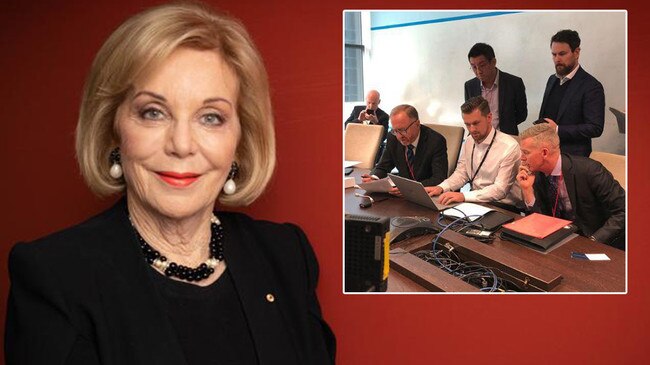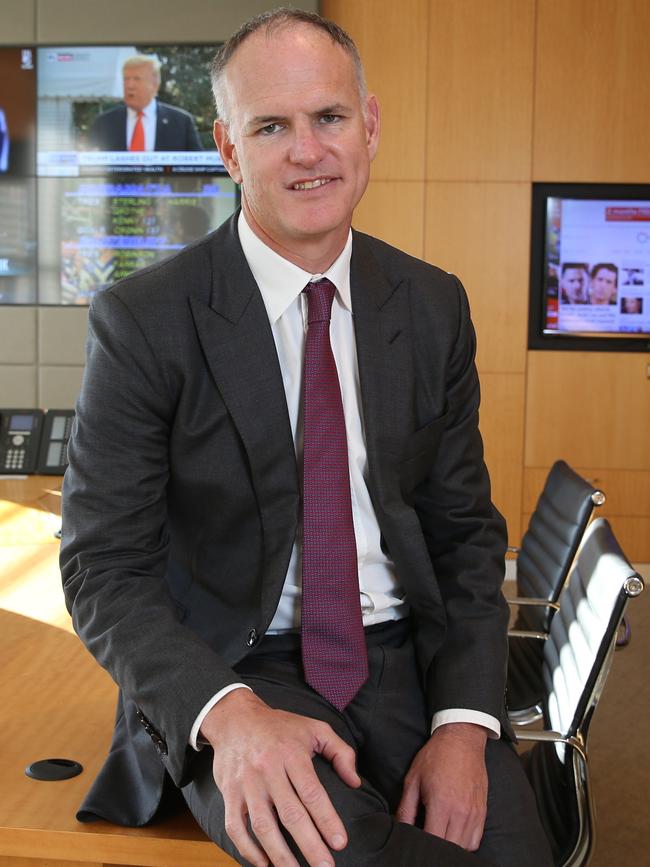I will fight any attempt to muzzle ABC: Buttrose
ABC chair Ita Buttrose registers concern with Canberra over “unprecedented’’ police raids.

ABC chairwoman Ita Buttrose says raids on the public broadcaster were “designed to intimidate” and has demanded assurances from new Communications Minister Paul Fletcher that they never happen again, saying she will “fight” any attempts to undermine press freedom.
The Australian revealed this morning that Ms Buttrose had raised her concerns about Wednesday’s police raids directly with the Communications Minister, joining News Corp Australia chairman Michael Miller in demanding the government protect press freedom.
Ms Buttrose, a veteran of Australian journalism, said the raid was unlike anything she had seen in her long career.
“The raid is unprecedented — both to the ABC and to me,” she said in a statement today.
“In a frank conversation with the Minister for Communications, Cyber Safety and the Arts, Paul Fletcher, yesterday, I said the raid, in its very public form and in the sweeping nature of the information sought, was clearly designed to intimidate.
“I also asked for assurances that the ABC not be subject to future raids of this sort. Mr Fletcher declined to provide such assurances, while noting the ‘substantial concern’ registered by the Corporation.”
MORE: Australia Federal Police chief warns journalists and MPs not immune from prosecutions | Chris Merritt writes AFP raids help to shine a light on secrecy abuse
Six plainclothes AFP officers spent more than nine hours at ABC’s Ultimo headquarters in inner Sydney, sifting through thousands of documents relating to the Afghan Files series.
The ABC search warrant, which named journalists Dan Oakes and Sam Clark, and news director Gaven Morris, revealed that police were looking for notes, emails, correspondence, graphic sketches, reports and secret documents relating to David McBride, a former legal adviser to Australia’s special forces in Afghanistan.
Mr McBride was committed for trial last week in the ACT on charges including the theft of documents containing evidence of alleged misconduct committed by Australian special forces in Afghanistan and which formed the basis of the ABC’s 2017 report.
AFP acting commissioner Neil Gaughan yesterday defended federal police from criticism over raids, and would not rule out the arrests of journalists in the future.
Ms Buttrose today said she took national security concerns seriously, but would defend the public broadcaster’s independence and the “community’s right to know.”
“In my view, legitimate journalistic endeavours that expose flawed decision-making or matters that policy makers and public servants would simply prefer were secret, should not automatically and conveniently be classed as issues of national security,” she said.
“The onus must always be on the public’s right to know. If that is not reflected sufficiently in current law, then it must be corrected.
“As ABC Chair, I will fight any attempts to muzzle the national broadcaster or interfere with its obligations to the Australian public. Independence is not exercised by degrees. It is absolute.”
Her comments followed this week’s AFP raid of ABC headquarters in Sydney on Wednesday, which came less than a day after the AFP raided the Canberra home of senior News Corp Australia press gallery reporter Annika Smethurst.
Last night, Michael Miller, executive chairman of News Corp Australasia, reiterated his concern about “the growing number of laws with the power to put journalists in jail”.
“It is a danger to our democracy when professional news reporting is at risk of being criminalised. The times we live in demand greater examination of issues that affect all Australians, not less. We stand by both our reporting and Australia’s right to know,” he said.

The Australia Federal Police chief yesterday warned that journalists and MPs are not immune from criminal prosecutions, leaving open the possibility of jail terms for those found to have broken the law. AFP acting commissioner Neil Gaughan yesterday defended federal police from criticism over raids.
When asked if ABC or News Corp Australia journalists should be charged, he said it was too soon to say. “I’m not going to rule in or rule out any one subject to further charges,’’ Mr Gaughan said.
“Our investigations are an objective search for the truth. It involves the discovery and presentation of evidence in an exhaustive, comprehensive, and organised manner. No sector of the community should be immune to this type of activity or evidence collection more broadly.
“This includes law enforcement itself, the media, or indeed, even politicians. There are criminal allegations being investigated and we cannot ignore them.”
The raid on the ABC raised the ire of executives and journalists, including managing director David Anderson.
Mr Anderson, who was appointed MD last month, said it was “highly unusual for the national broadcaster to be raided in this way”.
“This is a serious development and raises legitimate concerns over freedom of the press and proper public scrutiny of national security and defence matters,” he said.
“The ABC stands by its journalists, will protect its sources and continue to report without fear or favour on national security and intelligence issues when there is a clear public interest.”



To join the conversation, please log in. Don't have an account? Register
Join the conversation, you are commenting as Logout